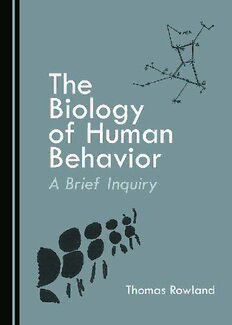
The Biology of Human Behavior PDF
Preview The Biology of Human Behavior
The Biology of Human Behavior Also by the author: Exercise and Children’s Health Children’s Exercise Physiology Pediatric Exercise Medicine (with Oded Bar-Or) The Athlete’s Clock Biological Regulation of Physical Activity Tennisology A Philosophy of Tennis, or You Kant Be Serious Controversies in Exercise Science The Fatigue Chronicles. Searching for the Limits of Human Physical Performance The Biology of Human Behavior : A Brief Inquiry By Thomas Rowland The Biology of Human Behavior: A Brief Inquiry By Thomas Rowland This book first published 2020 Cambridge Scholars Publishing Lady Stephenson Library, Newcastle upon Tyne, NE6 2PA, UK British Library Cataloguing in Publication Data A catalogue record for this book is available from the British Library Copyright © 2020 by Thomas Rowland Cover: Hercules, revealed by Thomas Rowland All rights for this book reserved. No part of this book may be reproduced, stored in a retrieval system, or transmitted, in any form or by any means, electronic, mechanical, photocopying, recording or otherwise, without the prior permission of the copyright owner. ISBN (10): 1-5275-4476-1 ISBN (13): 978-1-5275-4476-5 We are so small in every way compared with what there is, and so ignorant. Mystery surrounds us on every side. —Bryan Magee TABLE OF CONTENTS Picture Credits ......................................................................................... viii Preface ....................................................................................................... ix 1. Love ........................................................................................................ 1 2. Travelling ............................................................................................. 18 3. Jealousy ................................................................................................ 36 4. Meaning ................................................................................................ 51 Entr’Acte I. Créativité et Le Petit Déjeuner ............................................. 65 5. Suicide .................................................................................................. 69 6. Eternal Recurrence ............................................................................... 88 7. Aging .................................................................................................. 104 8. Reflections .......................................................................................... 124 Entr’Acte II. Foucault for the Television Football Watcher .................. 140 9. Music .................................................................................................. 144 10. Adultery ............................................................................................ 163 11. Reality .............................................................................................. 182 12. Regret ............................................................................................... 203 Closing Comments ................................................................................. 219 PICTURE CREDITS Figure 2.1. Personal collection of the author Figure 3.1. Wikimedia Commons/ Public domain Figure 5.1. Personal collection of the author Figure 8.1. Personal collection of the author Figure 10.1. Rembrandt Figure 11.1 Andrew Schmidt/ public domain PREFACE Biological science. And human behavior. Hardly expected to be close travelling companions, these two. The first describes the quest for understanding the objective reality in the living world around us (including Homo sapiens), while the second involves a confusion of emotions and experiences shared by the human psyche as we act out our lives, uncertain and subjective to say the least. The series of chapters that follow, however, will examine how evidence is gradually emerging that the two might surprisingly interface, and that much of what we experience and drives our behavior in our daily lives is controlled—at least to some extent—by objective biological processes. That’s what this book is all about—what science can tell us about the ways we behave and relate to our fellow humans. A spoiler alert: on reaching the final chapter, the reader should not expect to have discovered any facile solutions or definitive insights to such “inquiries,” but, rather, the author hopes, an awakening to lines of thinking that may ultimately provide us with such understandings. Of course, it would demand an inappropriate expenditure of ink and paper to consider all the means that science and its applications through technology have impacted our modern lives. Science has brought us the ability to communicate instantaneously with all our friends, back up our car in a tight parking lot without risk of collision, permit a denizen of Miami to demand a restaurant reservation for tomorrow night in Vancouver just by making an oral command. We no longer worry about contracting poliomyelitis, going blind from cataracts, or suffering gnawing heartburn from over-indulgences. One can be transported from Boston to any of the major capitals of Europe in not much more time than it takes to cook a 25- pound Thanksgiving turkey. The list could go on and on. Without doubt, science and technology have served us well in making our lives easier, safer, and more efficient. At the same time, one hesitates to be convinced that such advances have provided any advances in the more meaningful—and often challenging—aspects of the human experience. Here we can make a different list: establishing satisfying relationships with other persons, forming a loving, supportive family, working at a fulfilling occupation, behaving in an ethical manner, providing for the common good, finding a true meaning for one’s life. Again, the list could go on. But here, on these more substantial aspects of human existence, little appreciation
